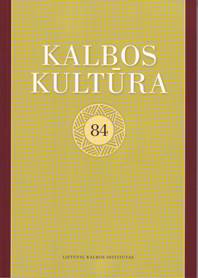Arbata: nuo žodžių – iki žodynų, nuo tekstų – iki tekstynų
Arbata: from words to dictionaries, from texts to language corpora
Author(s): Jurgita GirčienėSubject(s): Lexis, Semantics, Baltic Languages
Published by: Lietuvių Kalbos Institutas
Keywords: etymology; semantics; lexicography; corpus linguistics; associative experiment;synonyms; derivatives and compounds; collocations;
Summary/Abstract: On the basis of diachronic research into the lexicon and lexicographic sources, texts and corpora, representing public and private usage and accessible via the general internet search system, as well as the materials collected by the verbal association experiment, the paper sets out to examine the etymology, semantics, relations with synonymous Lithuanian words referring to beverages, derivatives and compounds and tendencies of present-day usage of the loan word arbata (‘tea’).As attested by written data, including lexicographic sources, changes in the phonetic substitution, tea and the loan word referring to it reached Lithuania in the 18th century, which was later than other Western European countries. Lithuanians adopted the word arbata from the Polish herbata; the word was the result of blending of the words of two completely different languages: the Latin herba (‘herb’) and the Southern Chinese tē (‘herb used for making tea’). Poles, however, have preserved the first component in full. They borrowed the word from Western European languages, cf. the Dutch herba tee.The loan word arbata in Lithuanian refers to white, green, black tea, a specific hot drink produced from the dried (fermented) leaves of the Chinese tea bush, and any other hot (sometimes cold) drink, made from various herbs and fruits, jams etc., except for coffee and cocoa. Such results of the investigation attest to a demand to amend the meaning of arbata as a beverage, cf. gėrimas su arbatžolėmis (‘a beverage with the leaves of the tea bush’).The well-established meaning (‘any hot beverage’) of this fairly new loan word poses a question, if earlier Lithuanians did not have a need for hot beverages. As attested by lexicographic materials, Lithuanians did have their own words referring to hot beverages, cf.: karštimas, žolìkės, žolỹnė, žoliẽnė, žolainė. However, all of them are now extinct.The importance of the beverage referred to by the loan word can also be seen in the ample and still expanding entry of the word arbata. Older fundamental lexicographic sources offer 23 hybrid derivatives and compounds with the root arbat-, e.g. arbatauti (‘to have tea’), arbatinė (~’tea bar’), arbatinis (‘tea pot, tea kettle’), arbatpuodis (‘tea cup’), arbatšaukštis (‘teaspoon’), arbatuotis (~’to have tea’). The informants of the above associative experiment also suggested some new coinages which have later been found in actual usage: arbatmaišis (‘tea bag’), arbatvakaronė (‘tea party’), arbat(o)geris (‘tea drink’). A number of (stylistically marked) neologisms were found in actual usage but have not been included into the dictionaries, such as arbatvakariai (~’tea evenings’), arbatdienis (~‘tea day’), arbatinukėlis (~’a small tea pot’), arbatpienė (‘milk for one’s tea’) pienarbatė (‘milky tea’); arbatžmogis (~’tea person’), arbatšokis (~’tea dance’). A possibility to include the spreading neologism arbatintis (~‘to have tea’) into dictionaries should be discussed.
Journal: Bendrinė kalba (iki 2014 metų – Kalbos kultūra)
- Issue Year: 2011
- Issue No: 84
- Page Range: 246-258
- Page Count: 13
- Language: Lithuanian

